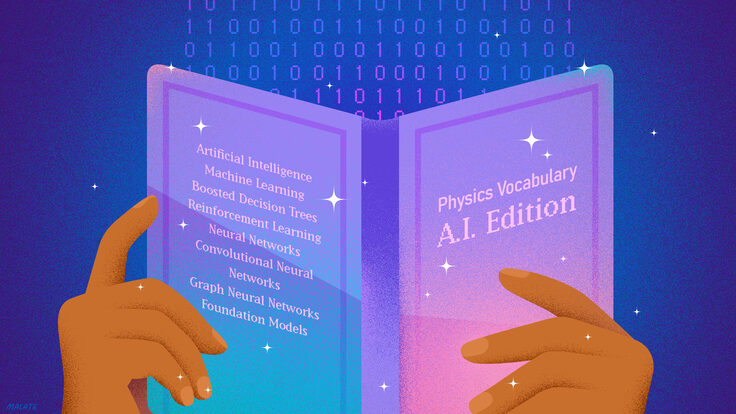As Russell Mammei and his three kids exited the hotel pool—sandals squeaking, swimsuits dripping, new giant inflatable alligator in tow—they crossed paths with one of Mammei’s colleagues, also in town for the physics conference.
“Oh hey, J.D.,” Mammei said, as he used his free hand to herd his chlorine-soaked youngsters out of the way.
It wasn’t the first time Mammei’s caregiving responsibilities had scuttled a chance for him to network.
“There were several people I wanted to talk to at that meeting,” he says, “but I couldn’t because I had all my little people with me and, you know, I had to make sure they didn’t die.”
Mammei and his wife, Juliette Mammei, are both physicists working in academia. Russell is an associate professor at the University of Winnipeg, and Juliette is an associate professor at the University of Manitoba.
They usually take turns attending conferences so that one parent can stay home with the kids, “but in this case, we were both invited to speak, and we both thought it was good for our careers to go,” Russell says.
So, the whole family went.
Mammei is now amused by the memory of the soggy encounter. But he says it also represents one of the challenges of being a parent in physics.
Parents in physics are often concerned about whether colleagues will perceive them as professional or committed to their careers. So it can be stressful to even let others know that they have caregiving responsibilities—something that was hard for Mammei to hide in the conference hotel.
“Most people are perfectly fine seeing you with your kids,” Russell says, “but it is a little weird and uncomfortable.”
Around a quarter of the 1,500 respondents to a survey of early-career physicists, conducted as a part of the Snowmass 2021 US high-energy physics planning process, reported that they are full or part-time caregivers, the vast majority for children.
About 37% of caregivers reported that they often “have to rearrange [their] work schedules, decrease [their] hours, or take unpaid leave because of [their] caregiving responsibilities.” About 40% of caregivers reported that they feel little to no support from funding agencies or the field.
The survey responses suggest that caregiving responsibilities bring on larger career consequences for women than men. Twice as many women as men reported some professional setbacks as a result of taking Family and Medical leave.
Parents in the field say they have seen changes over the years, but there is plenty of room for improvement.

Inconspicuously having children
For many physicists, the effort to balance caregiving responsibilities and career begins before their children are even born.
The Mammeis knew they wanted to have kids, but deciding when would be a good time to do so was tricky, as both were graduate students at Virginia Tech. “We definitely knew we could not have a kid while we were taking classes because we were working way too hard,” Russell says.
But having kids in grad school—which they did after finishing their classes but before finishing their theses—had a benefit: It gave them a unique chance to stay under the radar.
“Juliette read that it’s generally detrimental to your career to have children, especially if you’re a woman,” Russell says, “because you usually take some time off and then that’s a gap period where other people have papers or accomplish other things.
“But if you have children when you're a graduate student, you're just a grad student. So when you put on your resume or CV ‘grad student from this year to this year,’ it's kind of hidden that you took any time away from your work.”
It’s not an ideal solution. Advisors don’t always allow it.
In Canada, Russell says, the Natural Sciences and Engineering Research Council allows advisors to request up to one additional year of funding for graduate students who need to take parental leave. But parental leave for graduate students in the United States is largely unfunded.
“So yes, a student can take maternity leave if their advisor is flexible with them,” says Christine Nattrass, a physicist and assistant professor at the University of Tennessee at Knoxville. “But they’re not guaranteed that; they’re not going to be earning income [without parental leave]; and the advisor is still judged on the student’s productivity, so if the advisors are generous, they get punished.”
Those drawbacks, plus the instability that comes with being a graduate student or early-career physicist, prompt others to wait to have kids.
“It wasn’t clear for a long time if one or both of us would find jobs in physics, and maybe neither of us would,” says Ted Kolberg, a physicist at Florida State University and father of two. “So that makes it hard to start a family at a young age.”
Kolberg and his wife, Rachel Yohay, also a physicist, decided to postpone having kids until both secured tenure-track positions at the same university. They took a semester they had off from teaching, when they would usually be focused on research, to stay home with their new baby.
Having a secure job and reliable income “just takes a lot of the pressure off that many younger families have to deal with,” Yohay says. However, “now that I know how much work and energy goes into raising young kids, I’m glad we started when we did and didn’t wait even longer.”
Bo Jayatilaka, a physicist at Fermilab and father of one, echoes that sentiment. “There’s certainly a desire to be in a position where you think you’ll be in the same spot for at least a couple of years before becoming a parent,” he says.
Several years passed before Jayatilaka and his wife, a neuroscientist and medical doctor, felt secure enough in their careers to have kids. However, he says, “in an ideal world, we would have liked to become parents sooner than we did.”
Physicist Chilufya Mwewa-Kapya says that when she was pregnant with her first child as a PhD student at CERN, she didn’t consider how having a child would affect her career. “I just wanted to have a baby.”
Her attitude changed, however, by the time she was ready to have her second child. She began to worry that her colleagues would think less of her for becoming pregnant.
“I’m supposed to be pushing my career forward, and pregnancy and children could affect how I work,” she says. “It’s also very rare to see a pregnant woman around our workplace, so I wasn’t sure how I was mentally going to survive moving around with a pregnancy.”
Fortunately, her experience was largely positive, says Mwewa-Kapya, now a research associate at the US Department of Energy’s Brookhaven National Laboratory.
But stereotypes about motherhood can affect even women without children.
When Nattrass first met a senior male collaborator, she says, he immediately asked if she had kids. She did not at the time, and when she said no, “he said that I should have them right away because it was the only thing that would make my life meaningful.”
A colleague who was with her was in complete shock, she says, because “no one had ever said anything like that to him.”
In contrast, men may be expected to treat work as more meaningful than family. Hours after Tulika Bose, a physicist and professor at the University of Wisconsin-Madison, gave birth to her first child, her husband, Kevin Black, also a physicist and professor at UW-Madison, insisted on leaving the hospital to go teach his evening class. He says he felt that colleagues would not take him seriously if he started “not showing up for things.”
He now regrets leaving the hospital and says that it would have been fine for him to take time for his family. But back then, it felt impossible to miss the class; there was no concept of paternity leave.
A culture shift
Physicists are still rewarded for prioritizing their careers above all else, says Dakotah Tyler, a PhD student in astronomy at University of California, Los Angeles and father of two. “There are people who spend 20 hours [per day] on work, and that’s who you’re competing with,” he says.
Nonetheless, he’s hopeful his generation of physicists will begin to challenge the idea that parenting and success in physics are incompatible. “Not everyone wants a family, of course,” he says, “but I hate the idea of people feeling like they are pressured out of a field they love because they wanted to have a family.”
To better retain parents and other caregivers, physics needs to change, says Russell Mammei. That includes supporting physicists who need to be away from work.
At some point, everyone needs accommodations, Nattrass says. “I don't view this as a dichotomy between ‘physics is life’ and ‘this is just a job,’ because everybody has a life outside of their job. Kids are just different types of constraints.”
Institutions and funding agencies have important roles to play. But individuals can also be a part of shifting the culture of physics, she says.
When Nattrass found out a graduate student in her department was scheduled to take his qualifying exams two weeks after his child was due, she insisted that he reschedule the exam.
In a culture where physicists worry that voicing their needs will damage their careers, offering such support is difficult, Nattrass says. “I think the fact that he didn't feel comfortable talking about it is a big problem.”
Bose received support from a senior colleague when she was trying to plan her first trip to CERN after giving birth.
Her colleague wrote to her and told her to stop stressing over trying to make the trip happen and just spend time with her new infant. “I thought that was one of the most useful pieces of advice I ever got from anybody,” Bose says. “Somehow we have to create this environment where people both feel that it's okay to take some time off to have this child and be with them and not constantly be stressed.”
There’s still a risk that accepting accommodations, even when offered, will affect colleagues’ assessment of your abilities, Bose says.
When Bose did take that first trip back to CERN, she was given the key to a storage room where she could pump milk in private. At the end of the trip, her colleagues expressed astonishment that she was able to get work done as a nursing mother.
“It just wasn’t very common,” she says. “It was quite often that I would meet people at CERN, who would, in the kindest way, say, ‘I'm really amazed how you can have a child and do all the work that you're doing.’”
That perception leads to incorrect and hurtful assumptions about parents in the field. A senior colleague on a project mocked Nattrass for nursing her child and accused her of not doing her job. Nattrass reported the incident to a supervisor, but the colleague suffered no repercussions. Nattrass says she felt unsupported, so she decided to leave the project. She was later accused of not being a “team player,” she says.
The idea that physicists must “live and breathe” work is probably due to the history of the field, Jayatilaka says.
“Physics used to be dominated by men who had other people—namely, their partners—who were able to take care of all the family obligations for them,” he says. “But that should never be expected, and it isn’t the expectation now.”
Senior physicists and mentors, in particular, play an important role in making physics more welcoming to parents, he says. “It’s a culture shift that has to happen, and it has to happen at all levels. And I think it is happening, but it’s not happening fast enough.”













